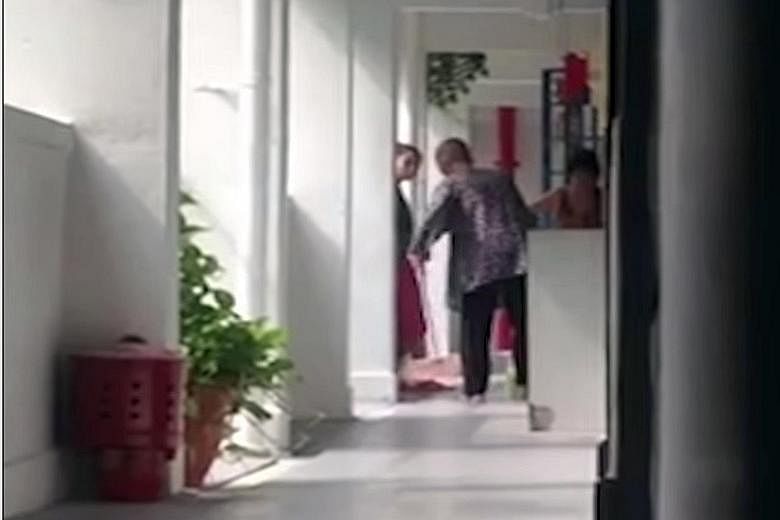As online vigilantism catches on and people use social media to publicise wrongdoing, experts have called for the authorities to set up online channels of reporting.
Social media experts said that these channels will make investigations more systematic and prevent the public from jumping to conclusions.
"These channels should be set up, with manpower devoted to handle online reporting," said Assistant Professor Vivian Chen from the Wee Kim Wee School of Communication and Information at Nanyang Technological University.
The latest in the public glare was a video of a 58-year-old woman being slapped by her 25-year-old daughter. It was filmed by a neighbour and posted on Facebook last month.
Other videos on bad behaviour that circulated online this year included clips of a woman assaulting a condo manager in May, Singapore Civil Defence Force officers trashing a dorm in April, and a passenger verbally abusing a taxi driver.
Currently, there are hotlines for people to report abuse cases. The Traffic Police also have a feedback portal for people to submit videos of traffic violations and have received nearly 100 videos from last December to March.
But there is otherwise hardly any dedicated portal for people to submit videos of perceived wrongdoing that may require investigation.
For sure, the trend in flagging wrongdoing online has had positive effects. Some said the visibility of these posts exerts public pressure that may prompt the authorities to act faster. The elder-abuse video led the Ministry of Social and Family Development (MSF) to post a statement on its Facebook page the day the video was uploaded. Such videos also prompt others to take action. When a netizen saw the video, he reported it to the police.
Social media also encourages people who shy away from reporting such cases to highlight them online instead. This can help uncover more cases: While the MSF is notified of about 200 cases of elder abuse every year, social workers said that this is the tip of the iceberg.
However, experts warned that there is a need for dedicated online channels, as online vigilantism may lead to inappropriate or even harmful actions.
In the case of the elder-abuse video, Social and Family Development Minister Tan Chuan-Jin had voiced concerns that it sparked a "public jury or trial of the individuals concerned".
He had said that it was "not appropriate for various members of the public to chip in and criticise one particular party, or canvass for particular actions, or call for people to visit them".
Dr Michael Netzley, a social media expert from Singapore Management University, agrees. "We are seeing only a few seconds or minutes and have none of the context. The possibility for misunderstanding is simply too great," he said.
-
About the case
-
A video of Madam Kamisah Burel, 58, apparently being slapped multiple times by her daughter Siti Nur Redha Khamis was put online by a concerned neighbour on July 20.
The clip of the incident at the doorstep of a flat in a Lower Delta Road block went viral and was viewed more than half a million times in a day. On the very night that the video was posted, the Singapore Civil Defence Force took the elderly woman to Singapore General Hospital for treatment. The police and the Ministry of Social and Family Development also said they would investigate the matter the next day.
On the Friday of the same week, their neighbour Darwinder Singh, 39, was arrested and charged in court. He was accused of abetting Madam Kamisah's daughter Siti, 25, in feeding her mother human faeces and urine.
He was later hit with two more charges of abetting Mr Khamis Abas, understood to be Madam Kamisah Burel's husband, in feeding her faeces and urine in April. He also allegedly slapped Mr Khamis sometime last year.
Janice Tai
Besides intruding on the privacy of individuals and compromising their well-being, the online vigilante can easily morph into the bully himself, experts said.
"Online vigilantes can take it into their own hands to cyber bully the people seen to be in the wrong," said Mr Delane Lim, chief executive of Agape Group Holdings, which runs youth development courses.
In the case of Sim Lim Square mobile phone retailer Jover Chew, who was accused of cheating customers, private information, such as his mobile phone number and address, was revealed to the public.
Said Mr Lim: "The online portal will make it easier for the authorities to obtain specific information, yet control the flow of information by monitoring the content or comments that are inappropriate for public viewing."
Assistant Professor Natalie Pang, also from the Wee Kim Wee School, said the authorities "can leverage the public to gather more evidence and try to make it easier for people to report cases", as some find it easier to go online than go to the police.
Mr Chong Ee Jay, a member of the Media Literacy Council and manager at Touch Cyber Wellness, a voluntary welfare group that teaches Internet safety, warned that the public should not be impatient and take matters into their own hands.
"They need to know that there are proper procedures... to report incidents and to trust the authorities to investigate."


